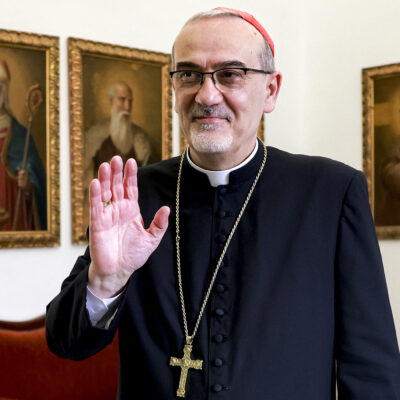Daily Kickoff
👋 Good Monday morning!
In today’s Daily Kickoff we report on a meeting between White House officials and Orthodox Jewish leaders to discuss combating antisemitism, and interview North Carolina Rep. Wiley Nickel about his personal connection to Judaism. Also in today’s Daily Kickoff: Marcia Riklis, Joshua Foer, Rep. Susan Wild and Noa Tishby.
President Joe Biden spoke with Israeli Prime Minister Benjamin Netanyahu yesterday, following a meeting in Sharm El Sheikh, Egypt, between senior political and security officials from Israel, the Palestinian Authority, Egypt, Jordan and the United States that sought to reduce tensions between the Israelis and the Palestinians ahead of the Ramadan, Passover and Easter holiday season.
Biden “reinforced the need for all sides to take urgent, collaborative steps to enhance security coordination, condemn all acts of terrorism, and maintain the viability of a two-state solution,” according to a readout of the call from the White House.
The president also “underscored his belief that democratic values have always been, and must remain, a hallmark of the U.S.-Israel relationship, that democratic societies are strengthened by genuine checks and balances, and that fundamental changes should be pursued with the broadest possible base of popular support,” the readout said. This was reportedly the first time the two leaders have discussed the Israeli government’s judicial overhaul plans. Biden offered support for efforts underway to forge a compromise on proposed judicial reforms “consistent with those core principles.”
A statement from the Israeli Prime Minister’s Office noted that Netanyahu told Biden that “Israel was, and will remain, a strong and vibrant democracy.” Netanyahu’s office’s statement said that the focus of the discussion was the Iranian threat and “expanding the circle of peace.”
More than three dozen Orthodox Jewish leaders and community members shared their experiences with antisemitism in a Friday virtual meeting with White House officials, amid a national rise in antisemitism.
Senior officials from the National Security Council and the Domestic Policy Council attended the call, which was convened by White House liaison to the Jewish community Shelley Greenspan. Aaron Keyak, the deputy special envoy to monitor and combat antisemitism at the State Department, was also on the call.
Orthodox Jews are “on the frontlines [of antisemitism] because they’re identifiable as Jews, so they feel it, in some ways, more than others,” said Ezra Friedlander, a Hasidic public relations executive who was on Friday’s call. “I’m grateful that the White House felt it was important to reach out specifically towards the Orthodox Jewish community to hear from them, because oftentimes, our perspectives are overlooked.”
The meeting was one of several listening sessions that the White House has hosted as part of an effort to create a national policy to combat antisemitism. The policymaking effort is the first initiative of an interagency group tasked with combating antisemitism, Islamophobia and “related forms of bias and discrimination.”
NICKEL FOR YOUR THOUGHTS
For Wiley Nickel, ‘never again,’ is a personal declaration

In one of his first floor speeches as a House member early last month, Rep. Wiley Nickel, a freshman democratic congressman from North Carolina, took a moment to acknowledge the victims of a deadly shooting that had recently occurred outside a Jerusalem synagogue on International Holocaust Remembrance Day. The incident in late January, in which seven Israelis were killed by a Palestinian gunman, “was no random act of violence,” Nickel said from the lectern. “This was a heinous and cowardly attack rooted in hate, bigotry and antisemitism.” “In the face of such evil, it is imperative that we come together not as Democrats or Republicans but as Americans committed to fighting against antisemitism and defending the sacred relationship between the United States and Israel,” he added. “‘Never again’ is more than a mere hashtag for social media. It is a solemn oath.” For Nickel, 47, such declarations are personal, he explained in an interview with Jewish Insider’s Matthew Kassel not long after his speech.
Shared story: “The Jewish community, their story is my story,” he said. “My mother is Jewish. My great-grandfather fled Poland prior to the Holocaust and would not be here today if he had stayed in Poland. When we talk about antisemitism, we need to continue to speak up.” Despite a verifiable claim to Jewish heritage, Nickel made clear — in contrast to a certain Republican lawmaker from New York — that he is not a practicing Jew and, like his father, identifies as Episcopalian, even as he grew up in a mixed-faith household celebrating Passover and observing the High Holidays with his mother’s family. Nickel’s maternal great-grandfather, Harry Sott, fled Jewish persecution in Poland in 1907 and ultimately settled in Detroit, according to an immigration document provided by the congressman’s office. (The record describes Sott as “Hebrew.”) He met his wife, who had escaped the same Polish town, in the U.S., a spokesperson for Nickel told JI.
Family history: Harry Sott, who worked on the assembly line for the Ford Motor Company, became a successful textile manufacturer and then retired to California, where he bought land. His son, Herbert, would also prosper, though his effort to become a practicing attorney was not without its challenges, Nickel said of the hardships his grandfather endured before opening a real estate law firm that is now one of the largest in Michigan. “People wouldn’t hire him because he was a Jew,” Nickel told JI. “I certainly have a deep appreciation for the challenges the Jewish community faces.”
On his radar: As a new member of Congress, Nickel, a former state senator and Obama administration staffer, says he is keeping those challenges in mind amid an uptick in antisemitic incidents, including in North Carolina. “This is an incredibly important issue to me,” he vowed. The congressman said he has joined the House Bipartisan Task Force for Combating Antisemitism, which is now led by a fellow North Carolina Democrat, Rep. Kathy Manning. He has also signed onto legislation promoting Holocaust education as well as a resolution “recognizing Israel as America’s legitimate and democratic ally and condemning antisemitism.”
Israel-bound: Moreover, Nickel said he is planning to take his first trip to Israel this August with a House delegation of freshman Democrats sponsored by the AIPAC-affiliated American Israel Education Foundation, whose annual trips to the Jewish state are a rite of passage for many new congressional lawmakers. “We need to continue to strengthen our military, economic and cultural ties with Israel to make sure that we have peace in the Middle East,” he told JI. Nickel supports a two-state solution to the Israeli-Palestinian conflict negotiated directly between both parties, he said. “The U.S. has a role to play to facilitate those discussions,” he argued, “but both Israelis and Palestinians have legitimate aspirations.”






















































